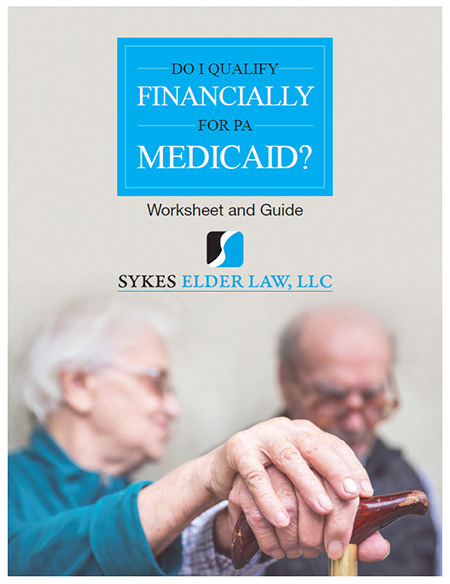Federal law provides a number of protections for a Medicaid applicant’s spouse (also known as a “community spouse”). Problem is, too few people know of these protections and too many couples fail to take advantage of them.
Result? A couple can lose tens of thousands, or even hundreds of thousands, of dollars unnecessarily, often placing the spouse in danger of impoverishment.
Here are seven of the biggest mistakes to avoid.
1. Purchasing exempt assets before date of admission
One major protection for the spouse is the “community spouse resource allowance,” or CSRA for short.
To understand the CSRA, you need to know that the state considers some assets “exempt” from being spent down to qualify for Medicaid. For example, a couple’s residence, one motor vehicle, household goods and furnishings, medical equipment, jewelry, and a number of other items are exempt.
Other assets, such as the couple’s checking and savings accounts, certificates of deposit, mutual funds, savings bonds, and so on, are typically considered “non-exempt,” meaning they are subject to spend-down.
Of these non-exempt items, a Medicaid applicant’s spouse may keep one-half as a CSRA, up to a maximum in 2019 of $126,420. For example, a couple whose non-exempt assets total $180,000 would be approved for a CSRA of $90,000. That means the spouse at home could keep that amount and not need to spend it down for the spouse in the nursing home to qualify for Medicaid.
Now, an important thing to realize about the CSRA is that it is calculated on the value of non-exempt assets owned by the couple on the date of admission to a nursing or other medical facility.
People sometimes go wrong by purchasing exempt assets before the date of admission in anticipation of applying for Medicaid. “Let’s hurry up and spend down some assets as soon as possible,” the thinking goes. An example shows how this thinking inadvertently backfires:
A couple with $180,000 in non-exempt assets buys two irrevocable burial reserves (which are exempt assets) for a total of $30,000 two days before the husband enters a skilled nursing facility. This purchase reduces their non-exempt assets to $150,000. The wife will now be approved for a CSRA of $75,000 (one-half of the non-exempt assets on date of admission), and $75,000 is potentially subject to spend-down.
Had the couple waited a few more days to make the purchase, the wife would have been approved for a CSRA of $90,000. Purchase of the burial reserves could have come from the couple’s remaining resources. Jumping the gun cost the couple $15,000 in guaranteed asset protection.
Solution: To avoid this mistake, defer buying any needed exempt assets until after date of admission to a qualifying facility.
2. Failing to use non-exempt assets to protect the spouse’s income
Federal law provides another important protection for the community spouse: the “monthly maintenance needs allowance” or MMNA for short.
The MMNA is an amount of income allowed to the spouse, ranging in amount from $2,058 to $3,160.50 a month. (These numbers are effective as of January 1, 2019 and are adjusted for inflation periodically.) A formula incorporating “shelter costs” such as utilities, rent or mortgage costs, real estate taxes and insurance premiums determines where the spouse falls between the minimum and the maximum.
Many spouses have income below their allowed MMNA. It quite often makes sense, if at all possible, to use the couple’s non-exempt assets to raise the community spouse’s income. Here’s an example:
Mr. Jones, who was the family breadwinner, recently entered a nursing facility. His wife Mary, who stayed home to raise the children, receives $584 per month from Social Security as her only income. She is approved for a MMNA of $2,100 a month. Her husband has income totaling $1,833 a month. The couple has $180,000 in non-exempt assets.
If they apply for Medicaid on their own, they may be denied benefits until they spend down $82,000. The gap between Mrs. Jones’ MMNA and her income will then have to come from Mr. Jones’ income. If her husband dies, Mrs. Jones may experience a drastic reduction in the income she receives for the remainder of her life.
However, with the right legal help, they may be able to purchase an annuity within Pennsylvania’s guidelines that would provide additional ongoing income to Mrs. Jones, and allow Mr. Jones to qualify sooner for Medicaid benefits. Rather than spend the money down, the couple could use their assets to ensure that Mrs. Jones has more long-term income.
Due to changes in Medicaid law in recent years, the process for using non-exempt assets to provide income for the spouse has become so complex that virtually every married applicant needs the advice of an elder law attorney to know whether to pursue this approach, and how to do it.
Solution: Couples should usually make it a major goal to obtain and maintain income for the spouse, who may live for 10 or 20 years or longer. Prior to spending down assets, consult an elder law attorney experienced in Pennsylvania Medicaid law to find out how to use assets that might otherwise be spent down to provide income for the spouse.
3. Spending down exempt resources
Did you know that a community spouse’s individual retirement account (IRA) is exempt from Medicaid spend-down, even if it contains hundreds of thousands of dollars? Spending down funds from a resource like that unnecessarily wastes the couple’s assets and endangers the spouse’s economic well-being in the future.
Solution: A couple should never start spending down assets without knowing for certain which ones are exempt.
4. Continuing to spend down after you would qualify for Medicaid
Some couples qualify for Medicaid benefits before they realize it. Perhaps they have received misinformation about the Medicaid program and they believe they must spend down half of all their assets before applying for benefits. They don’t realize that additional resources can be protected to provide income for the spouse, make exempt transfers, or for some other approved purpose.
It’s heartbreaking for us to meet for the first time with a client, only to realize that Medicaid benefits were available many months ago, but no one applied. Such a mistake can easily cost tens of thousands of dollars in unnecessary expenditures.
Solution: Determining when a couple could qualify for Medicaid benefits often requires numerous calculations involving the couple’s assets, incomes, shelter costs, nursing home expenses, and other figures. These calculations, and an assessment of the couple’s goals and objectives, should be made as soon as possible after admission to a nursing facility, to make sure the opportunity to receive Medicaid benefits is taken as soon as the couple qualifies.
5. Missing opportunities for exempt transfers
Federal and state law provide ineligibility penalties when Medicaid applicants (or their spouses) make gifts of money or property during the five-year “look-back” period.
But many people don’t realize that the law also provides exemptions from those gifting penalties. For example, there is no penalty for gifting money to a disabled son or daughter of a Medicaid applicant. A residence (or a partial interest in one) can be given to a son or daughter who has lived in the home for at least two years prior to the owner entering a nursing facility, if that child has provided care that has kept the owner from being institutionalized sooner. These are just two examples.
Failing to take advantage of exempt transfers available to Medicaid applicants could financially burden a family member needlessly.
Solution: Get expert advice about transfer penalty exemptions that may apply in your circumstances before you spend down assets to qualify for Medicaid.
6. Having an insufficient power of attorney
When a married applicant receives Medicaid approval, the couple has 90 days to make transfers of money or property to the community spouse. Even before that, assets in the name of the applicant may need to be liquidated, transferred, or spent down to qualify.
If the applicant lacks a power of attorney, and then becomes incapacitated due to disease, stroke, or dementia, savings opportunities can be lost.
If the applicant does have a power of attorney, does it have the needed provisions? Before you say, as many people do, “My power of attorney must have everything I need – it goes on for pages and pages,” look more closely. Does it contain gifting provisions? Does it authorize “unlimited” gifting or only “limited” gifting?
If gifting provisions are described as “limited,” the applicant’s spouse may have trouble meeting the 90-day transfer requirement. That is just one of the ways insufficiently drafted powers of attorney can cost couples thousands in unnecessary legal expenses, spend-down costs, or lost savings opportunities.
Solution: An elder law attorney experienced in Medicaid issues can prepare a power of attorney that contains the provisions you need to make sure you can qualify for Medicaid benefits while protecting assets for your spouse and other family members, even if you lose the ability to make your own decisions.
7. Not getting expert advice about how to pay for long-term care
Paying for long-term care in a nursing facility has become complicated, and the system grows increasingly complex. Government benefits can help, but you have to know how and when to qualify. Solutions vary depending on your unique circumstances and goals.
Proceeding without the right advice could cost you and your family dearly, or lead to the eventual impoverishment of your spouse.
Solution: For a modest consultation fee, you can have an elder law attorney review your circumstances and talk to you about how you can pay for long-term care while doing everything you can to protect assets and meet other goals.
This post provides general information for Pennsylvania residents and is not intended as a substitute for legal advice. Practices may vary in other states. For legal advice in a particular situation, you should consult with a lawyer.






